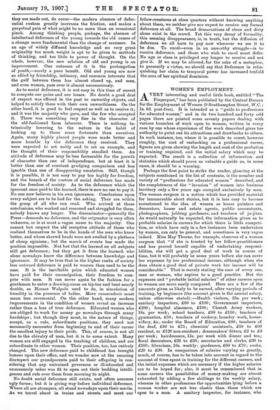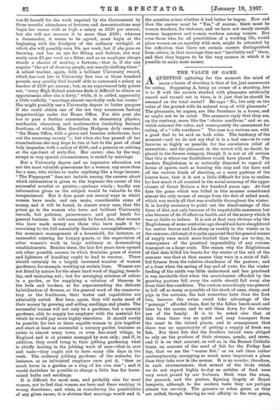WOMEN'S EMPLOYMENT.
AVERY interesting and useful little book, entitled "The Fingerpost," has been published by the Central Bureau for the Employment of Women (9 Southampton Street, W.C.; ls. 6d. post-free). It is intended as a "guide to professions for educated women," and in its two hundred and forty odd pages there are printed some seventy papers dealing with various branches of work open to women, written in every case by one whose experience of the work described gives her authority to point out its attractions and drawbacks to others. In each instance, too, where it is possible to count, however roughly, the cost of embarking on a professional career, figures are given showing the length and cost of the probation or training required, and the initial salary which may be expected. The result is a collection of information and statistics which should prove as valuable a guide as, in some cases, it should be a warning.
Perhaps the first point to strike the reader, glancing at the subjects mentioned in the list of contents, is the number and variety of "professions for educated women" described, and the completeness of the " invasion " of women into business territory only a few years ago occupied exclusively by men. The woman surgeon is a notion which has provided material for innumerable short stories, but it is less easy to become accustomed to the idea of women as house painters and decorators, house and estate agents, public accountants, photographers, jobbing gardeners, and teachers of jujitsu. As would naturally be expected, the information given as to probable salaries in careers for which there is little competi- tion, or which have only in a few instances been undertaken by women, can only be general, and sometimes is very vague indeed. Miss May Thorne, for example, observes of a woman surgeon that "if she is trusted by her fellow-practitioners and has proved herself capable of undertaking responsi- bilities, she will get a good deal of work in course of time, but it will probably be some years before she can cover her expenses by her professional income, although when she does obtain a good deal of private work her income will be considerable." That is merely stating the case of every one, man or woman, who aspires to a good practice. But the expenses and " probable initial salaries" of other careers open to women are more easily compared. Here are a few of the amounts given as likely to be earned, after varying periods of training, by beginners (the amount given is the annual salary, unless otherwise stated) m—Health visitors, 25s.. per week ; sanitary inspectors, £80 to £100; Government inspectors, £200; hospital almoners, £100; Church Army workers, 18s. per week; school teachers, £88 to £150; teachers of gymnastics, £50; teachers of cookery, laundry work, house- wifery, &c., under the Board of Education, 280; teachers of the deaf, £40 to 275; chemists' assistants, 250 to £60 resident, or 2120 non-resident ; dressmakers' fitters, 22 to £3 per week; hairdressers, 15s. per week with dinner and tea; floral decorators, 226 to 220; secretaries and clerks, £30 to
2100; librarians, 16s. weekly; gardeners, 260 to 270; cooks, 220 to 230. In comparison of salaries varying so greatly, much, of course, has to be taken into account in regard to the amount of time spent in training for the different careers, and the initial expenses which are necessary if the higher salaries are to be hoped for ; also, it must be remembered that in some careers the possibilities of money-making are almost exhausted by adding a few shillings to the weekly salary, whereas in other professions the opportunities lying before a woman worker are not less elastic than those which are open to a man. A sanitary inspector, for instance, who can fit herself for the work required by the Government by three months' attendance at lectures and demon'strations may begin her career with as high a salary as £120 per annum, but she will not increase it to more than £180; whereas a dressmaker, it seems to be agreed, must begin at the beginning with the drudgery of the ordinary workgirl, at which she will possibly earn 10s. per week, but if she goes on learning, and has an eye for fitting and fashion, she may easily earn £5 per week as a fitter, and as an employer always stands a chance of making a fortune,—that is, if she can acquire "the art of dressing people, not merely clothing them." A school teacher, again, with a brilliant University record, which has cost her in University fees two or three hundred pounds, may quickly find herself able to command a salary as teacher of £150 per annum ; but, as an experienced lady points out, "every High School mistress finds it difficult to obtain an appointment after she is forty," while, it is added, apparently a little ruefully, " marriage almost inevitably ends her career." She might possibly use a University degree to better purpose if she could obtain one of the not very numerous factory inspectorships under the Home Office. For this post she has to pass a further examination in elementary physics, mechanics, chemistry, and mathematics (including decimal fractions, of which, Miss Geraldine Hodgson drily remarks, "the Home Office, with a grave and humane eclecticism, bars out the recurring variety ") ; but when she has passed all her examinations she may hope to rise at last to the post of chief lady inspector, with a salary of £500, and a pension on retiring at the age-limit of sixty-five. Her career, also, by the way, except in very special circumstances, is ended by marriage.
But a University degree and an expensive education are not the most valuable possessions for a woman, any more than for a man, who wishes to make anything like a large income. "The Fingerpost" does not include among the careers about which information is given to the beginner the career of the successful novelist or painter,—perhaps wisely ; hardly any information given on the subject would be valuable to the inexperienced. But it does point out several ways in which women have made, and can make, considerable sums of money, and it will be found, in almost every case, that the prizes go to the women who have, not brilliant University records, but patience, perseverance, and good heads for general business. It will commonly be found, too, that women who have made money are those who have made it by exercising to the full essentially feminine accomplishments,— the economic management of a household, for instance, or successful catering for hungry guests, or the supervision of other women's work in large millinery or dressmaking establishments. Besides these, the last few years have opened out other possible careers, in which feminine grace of choice and lightness of handling ought to lead to success. There should certainly be a largely increased number of women gardeners, for example, working on certain lines. Women are not fitted by nature for the sheer hard work of digging, trench- ing, and manuring soil ; but for arranging schemes of colour in a garden, or for supplying a rotation of blossom in the beds and borders, or for superintending the delicate hybridisation of flowers, or the general work of the conserva- tory or the fruithouse, their tastes and capabilities are admirably suited. But here, again, they will make most of their money by growing and selling seedlings and plants. The successful woman will not only be a gardener, but a nursery gardener, able to supply her employer with the material for which he would pay more highly elsewhere. It should surely be possible for two or three capable women to join together and start at least as successful a nursery garden business as exists in almost every town, or even fair-sized village, in England and is at present managed by men only ; and if, in addition, they could bring to their jobbing gardening what is chiefly lacking in the jobbing work of men—that is, care and taste—they ought not to have many idle days in the week. The ordinary jobbing gardener of the suburbs, for instance, as an infuriated employer once put it, "does as much harm in a garden as a slug of his own size"; and it would doubtless be possible to charge a little lees for home- raised bulbs and seedlings, It is difficult for most men, and probably also for most women, not to feel that women are here and there working in wrong directions; and when, in considering the possibilities , of any given career, it is obvious that marriage would end its the question arises whether it bad better be begun. Now and then the answer must be " Yes," of Course; there must be women teachers, for inaance, and we have not nearly enough women inspectors and wOneen workers among women. But even those who, for all possibilities of a working life, would place women on an equality with men, might be attracted by the reflection that there are certain careers distinguished froth. others, in that marriage does not "inevitably end" them, and that they happen to be the very careers in which it is possible to make most money.







































 Previous page
Previous page